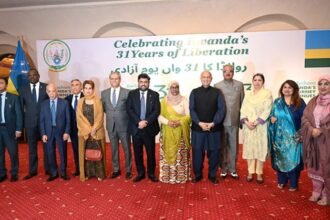PAKISTAN’S FUTURE IN A DECOUPLING US-CHINA WORLD
Iftikhar Khattak:

Global politics is dominated by the geopolitical competition between the United States and China, and international trade has long been influenced by their economic interdependency. However, growing tensions bring up the possibility of “decoupling”—a breaking of economic links that might change the balance of power in the world. Such a change has major geopolitical, strategic, and economic ramifications for Pakistan, a nation that is closely entwined with both countries.
The idea that China is on par with the US in terms of economic power is false, despite its rapid growth. Independent analyses show that China’s GDP is greatly overestimated, despite official Chinese numbers indicating near parity. Other metrics, such as satellite imagery of economic activity, indicate that China’s real GDP is almost half that of the US. The US and its allies now control high-value industries like semiconductors, biotechnology, and aircraft, where American companies account for 55% of revenue and those of their allies for 29%, The US lead is particularly noticeable. In comparison, Chinese high-tech companies make just 6% of global profits. Despite being a manufacturing powerhouse, China nevertheless depends on foreign companies for cutting-edge technology and expertise. The majority of Chinese companies’ profits are concentrated in locally orientated industries with little geopolitical relevance, such as banking, construction, and insurance. This fact provides Pakistan, whose economic links with China have become stronger because of the China-Pakistan Economic Corridor (CPEC), with both possibilities and risks. Pakistan may experience a decline in Chinese investments, postponed infrastructure projects, and slower industrial growth if China suffers economically because of the US-led decoupling. Pakistan, on the other hand, might reduce these dangers if it expands its economic connections and takes advantage of new alliances.
Decoupling would cause China to suffer disproportionately. With GDP losses ranging from 15% to 51%, China would experience an economic shock comparable to the Great Depression if the US and its allies severed economic links. The US, on the other hand, would have little long-term impact. American businesses have already started to lessen their vulnerability by moving their supply networks out of China.
This change may cause trade difficulties for Pakistan, especially in industries like energy, technology, and industrial equipment that depend on imports from China. Furthermore, China’s capacity to fund and maintain its projects in Pakistan, including CPEC, may deteriorate if its economy declines. Pakistan’s excessive dependence on China might backfire, particularly if Beijing finds it difficult to uphold its economic obligations. However, if Pakistan carefully aligns itself with new economic prospects, its trade with the US, which has historically been strong in textiles and remittances, might become more relevant.
The United States should carefully employ economic leverage instead of aiming for instant separation. China gains a great deal from its entry into international markets, which discourages belligerence. Washington should maintain choosy economic links, but it should be made clear that complete decoupling would follow any territorial aggression—especially against Taiwan. This tactic maintains deterrence without starting an economic war too soon.
Pakistan must carefully manage its relations with the two powers because of this policy. In the face of economic pressure from the US, an overt slant towards China might jeopardize Washington’s financial and diplomatic backing, particularly its access to international financial organisations such as the World Bank and IMF. Pakistan might benefit from both sides by attracting investment from China and preserving advantageous trade conditions with the US and its allies if it adopts a neutral stance and presents itself as a mediator.
Effective economic policy requires Washington to work with allies. In contrast to Russia, which was subject to unilateral Western sanctions following its invasion of Ukraine, China’s economic ties to both Europe and Asia make broad-based sanctions more difficult to implement. In the event of Chinese aggression, a formal economic alliance between the US and its partners might set up backup plans for supply chain changes, trade restrictions, and economic barriers. Coordination of this kind would guarantee economic resilience and bolster deterrence.
Pakistan’s economic stability, too, has to be reevaluated. The US depends on Chinese raw commodities, such as rare-earth metals, while China depends on Western companies for its technologies. In a similar vein, Pakistan’s economy is vulnerable to interruptions in Chinese supply networks. Pakistan should invest in domestic companies, diversify its trading partners, and improve its energy and technology security to lessen its reliance on any one state to protect itself from such threats.
Although the US has a definite economic edge over China, Washington’s use of this power is vital. An early economic division may incite hostilities and drive friends away. Rather than employing economic pressure as an instant weapon, the US should continue to preserve controlled reliance. This dissociation offers Pakistan options as well as risks. Pakistan can manage this changing geopolitical environment while defending its interests as a nation by taking a balanced stance, expanding its economic alliances, and bolstering its industries.
The writer is a PhD scholar. He can be reached at @IKhattakPhD.










